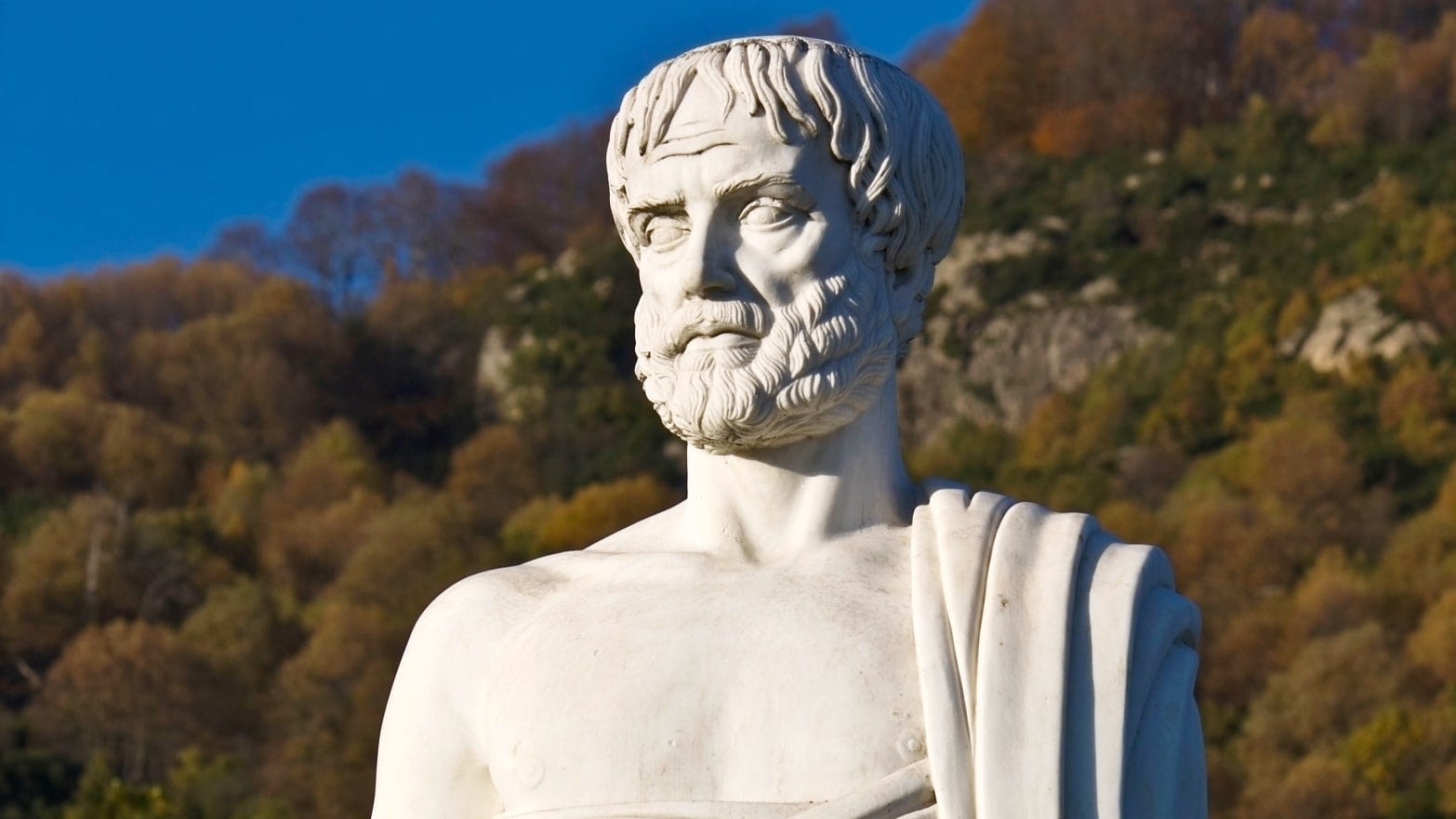Last Updated on February 26, 2024
Aristotle, more than any other philosopher in history, has determined the direction and content of Western thought. He authored philosophical and scientific systems that have influenced both Christian and Islamic thought from the medieval period to the end of the 17th century.
He lived his life simply, and he was involved with the great political leaders of his time. Even after new thinkers emerged centuries after his death, his concepts have remained at the core of western thought.
He continued to make significant contributions in logic, metaphysics, mathematics, biology, botany, ethics, medicine, agriculture, theater, and dance.
Early Life
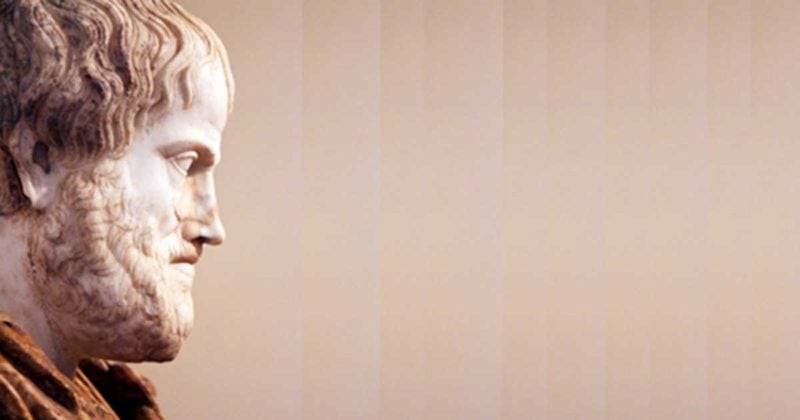
Aristotle was born in Stagira, Greece in 384 BC to parents who were practitioners of medicine. His father Nicomachus was a court physician to King Amyntus III of Macedonia.
Aristotle was only 10 years old when he died. Since his mother died earlier, he was brought up by a guardian, Proxenus of Atarneus. He taught Aristotle Greek, rhetoric, and poetry, complementing the biological lessons imparted by his father.
Later in life, Aristotle would write fine Greek prose, the legacy of his guardian-mentor.
Plato’s Best Student
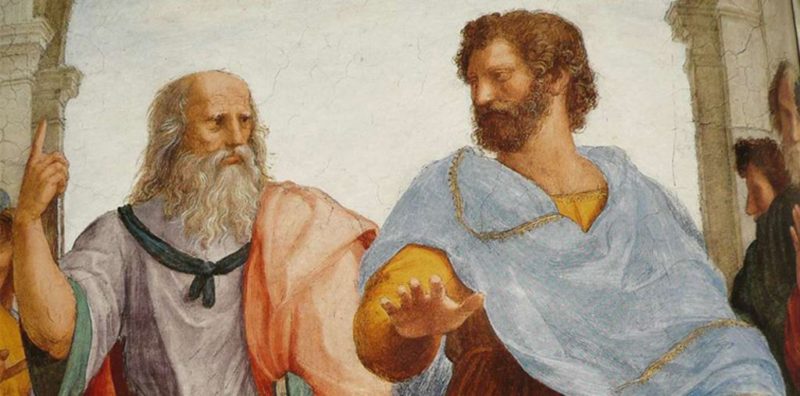
At 17 years old, he was forced to leave his home due to brewing hostilities in the court and went to study under the tutelage of the famous philosopher, Plato, in Athens.
The Academy was a renowned institute of higher learning, where people flocked to study as well as to teach. Over the next two decades, Aristotle immersed himself in the works of Xenocrates, Speusippus, and Eudoxus. They were some of the most influential thinkers of their era.
The founder of the Academy, Plato, was 45 years older, but that did not put the young Aristotle at a disadvantage. He began to use the blackboard in his lectures, astronomical charts, and other various instruments.
He also started his drafts on physics, metaphysics, ethics, politics, and rhetoric. Aristotle was particularly known for delivering exceptional speeches. He could deliver them clearly without failing to captivate his audiences.
Aristotle was also always open to learning other disciplines, ones that were taught way beyond the walls of his school. He was said to be well-versed in the philosophies of sophists, and in the works of medical writers and Greek poets.
Fleeing Athens
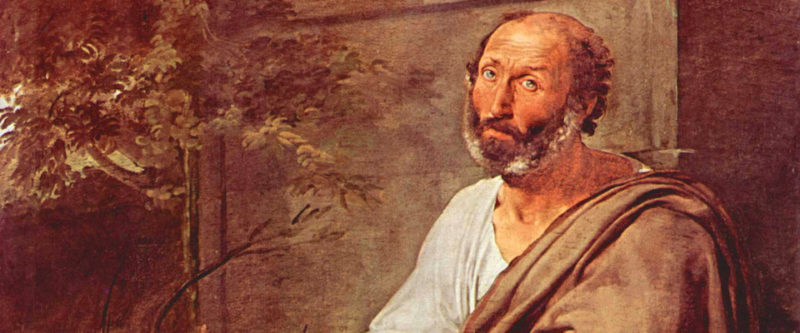
Following Plato’s death, a 38-year-old Aristotle fled Athens because of the growing political unrest. His friendship with the Macedonians did not sit well with the rulers of Athens. So, he traveled to Assos in Asia Minor.
There, he stayed for five years as a guest of the ruler. Although far from home, he continued to pursue his studies in philosophy, as well as the sciences. He married Pythias, the niece of his friend. They had a daughter named after her mother, and a son whom he named after his father, Nicomachus.
In 345 BC, Aristotle made his way to Mytilene in Lesbos. He was employed by King Philip of Macedon to tutor his 13-year-old son, Alexander, the future Alexander the Great.
There are no mentions of the boy in his works though, except for fragments of a letter, wherein he urged the young Alexander to rule the Greeks and become the master of the nations he conquered.
Alexander died when Aristotle was nearly 50. He returned to Athens and established his own academy close to Mount Lycabettus. It became a learning center that welcomed everyone.
It was also known for its unconventional architecture which had been dubbed Peripatos, which meant hall for strolls and discussions. Aristotle housed his collection of books as well as scientific instruments in this very building.
Aside from mentoring his students, he continued doing lectures before the public in the same manner of teaching he learned at Plato’s Academy. He also continued writing, polishing his earlier works and expanding on new writings.
Writings
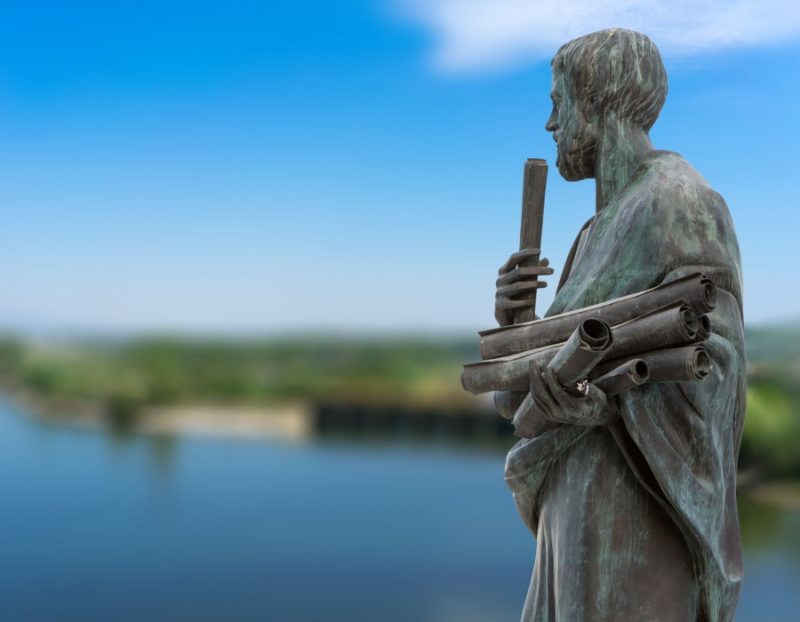
Aristotle was a prolific writer but only a few of his writings survived. The ones that did had over 2,000 pages. His earliest pieces consisted mostly of dialogues, or writings that were like conversations.
Some of his most important works that survived include Rhetoric, On Philosophy, Eudemus, Wealth, and On Prayer. They were written for the public and dealt with themes on philosophy, although these surviving works are likely considered lecture notes instead of literature.
There is a second group of writings made up of scientific and historical material. One of the most significant is the Constitution of the Athenians which formed part of a large collection of Constitutions collected and analyzed by Aristotle and his students.
The discovery of this manuscript in Egypt in 1890 shed light on the nature and character of Athenian democracy as practiced in the time of Aristotle.
From Athens, Aristotle returned to his mother’s home in Chalcis. There, he passed away due to an illness in 322 BC. He was 62.
Here are 125 famous quotes from Aristotle:
Aristotle Quotes
“The virtue of justice consists in moderation, as regulated by wisdom.” – Aristotle
“It is not once nor twice but times without number that the same ideas make their appearance in the world.” – Aristotle
“In a democracy the poor will have more power than the rich, because there are more of them, and the will of the majority is supreme.” – Aristotle
“All virtue is summed up in dealing justly.” – Aristotle
“Most people would rather give than get affection.” – Aristotle
“Poetry is finer and more philosophical than history; for poetry expresses the universal, and history only the particular.” – Aristotle
“To attain any assured knowledge about the soul is one of the most difficult things in the world.” – Aristotle
“Men are swayed more by fear than by reverence.” – Aristotle
“The beginning of reform is not so much to equalize property as to train the noble sort of natures not to desire more, and to prevent the lower from getting more.” – Aristotle
“The most perfect political community is one in which the middle class is in control, and outnumbers both of the other classes.” – Aristotle
“He who can be, and therefore is, another’s, and he who participates in reason enough to apprehend, but not to have, is a slave by nature.” – Aristotle
“A tragedy is a representation of an action that is whole and complete and of a certain magnitude. A whole is what has a beginning and middle and end.” – Aristotle
“Therefore, the good of man must be the end of the science of politics.” – Aristotle
“A great city is not to be confounded with a populous one.” – Aristotle
“We become just by performing just action, temperate by performing temperate actions, brave by performing brave action.” – Aristotle
“We are not angry with people we fear or respect, as long as we fear or respect them; you cannot be afraid of a person and also at the same time angry with him.” – Aristotle
“The least initial deviation from the truth is multiplied later a thousand fold.” – Aristotle
“For though we love both the truth and our friends, piety requires us to honour the truth first.” – Aristotle
“Misfortune shows those who are not really friends.” – Aristotle
“Politicians also have no leisure, because they are always aiming at something beyond political life itself, power and glory, or happiness.” – Aristotle
“Those who excel in virtue have the best right of all to rebel, but then they are of all men the least inclined to do so.” – Aristotle
“No notice is taken of a little evil, but when it increases it strikes the eye.” – Aristotle
“Temperance is a mean with regard to pleasures.” – Aristotle
“The state comes into existence for the sake of life and continues to exist for the sake of good life.” – Aristotle
“No one loves the man whom he fears.” – Aristotle
“Piety requires us to honour truth above our friends.” – Aristotle
“Perfect friendship is the friendship of men who are good, and alike in excellence; for these wish well alike to each other qua good, and they are good in themselves.” – Aristotle
“Bring your desires down to your present means. Increase them only when your increased means permit.” – Aristotle
“Inferiors revolt in order that they may be equal, and equals that they may be superior. Such is the state of mind which creates revolutions.” – Aristotle
“I have gained this from philosophy: that I do without being commanded what others do only from fear of the law.” – Aristotle
“Our judgments when we are pleased and friendly are not the same as when we are pained and hostile.” – Aristotle
“Of all the varieties of virtues, liberalism is the most beloved.” – Aristotle
“We must no more ask whether the soul and body are one than ask whether the wax and the figure impressed on it are one.” – Aristotle
”The moral virtues, then, are produced in us neither by nature nor against nature. Nature, indeed, prepares in us the ground for their reception, but their complete formation is the product of habit.” – Aristotle
“No excellent soul is exempt from a mixture of madness.” – Aristotle
“He who is to be a good ruler must have first been ruled.” – Aristotle
“Courage is a mean with regard to fear and confidence.” – Aristotle
“Mothers are fonder than fathers of their children because they are more certain they are their own.” – Aristotle
“Men acquire a particular quality by constantly acting in a particular way.” – Aristotle
“Those who educate children well are more to be honoured than they who produce them; for these only gave them life, those the art of living well.” – Aristotle
“Excellence, then, is a state concerned with choice, lying in a mean, relative to us, this being determined by reason and in the way in which the man of practical wisdom would determine it.” – Aristotle
“For one swallow does not make a summer, nor does one day; and so too one day, or a short time, does not make a man blessed and happy.” – Aristotle
“Change in all things is sweet.” – Aristotle
“In making a speech one must study three points: first, the means of producing persuasion; second, the language; third the proper arrangement of the various parts of the speech.” – Aristotle
“Even when laws have been written down, they ought not always to remain unaltered.” – Aristotle
. “No one would choose a friendless existence on condition of having all the other things in the world.” – Aristotle
“He who is unable to live in society, or who has no need because he is sufficient for himself, must be either a beast or a god.” – Aristotle
“We praise a man who feels angry on the right grounds and against the right persons and also in the right manner at the right moment and for the right length of time.” – Aristotle
“Men create gods after their own image, not only with regard t`o their form but with regard to their mode of life.” – Aristotle
“Without friends no one would choose to live, though he had all other goods.” – Aristotle
“A statement is persuasive and credible either because it is directly self-evident or because it appears to be proved from other statements that are so.” – Aristotle
“Probable impossibilities are to be preferred to improbable possibilities.” – Aristotle
“The law is reason, free from passion.” – Aristotle
“Man is the only animal capable of reasoning, though many others possess the faculty of memory and instruction in common with him.” – Aristotle
“All human actions have one or more of these seven causes: chance, nature, compulsions, habit, reason, passion, desire.” – Aristotle
“Love is composed of a single soul inhabiting two bodies.” – Aristotle
“Plato is dear to me, but dearer still is truth.” – Aristotle
“If one way be better than another, that you may be sure is nature’s way.” – Aristotle
“All men by nature desire knowledge.” – Aristotle
“Persuasion is clearly a sort of demonstration, since we are most fully persuaded when we consider a thing to have been demonstrated.” – Aristotle
“It is best to rise from life as from a banquet, neither thirsty nor drunken.” – Aristotle
“Bad men are full of repentance.” – Aristotle
“He who hath many friends hath none.” – Aristotle
“Well begun is half done.” – Aristotle
“The greatest virtues are those which are most useful to other persons.” – Aristotle
“Personal beauty is a greater recommendation than any letter of reference.” – Aristotle
“Nature does nothing in vain.” – Aristotle
“What it lies in our power to do, it lies in our power not to do.” – Aristotle
“Fear is pain arising from the anticipation of evil.” – Aristotle
“Suffering becomes beautiful when anyone bears great calamities with cheerfulness, not through insensibility but through greatness of mind.” – Aristotle
“We make war that we may live in peace.” – Aristotle
“Wit is educated insolence.” – Aristotle
“The secret to humour is surprise.” – Aristotle
“I count him braver who overcomes his desires than him who conquers his enemies; for the hardest victory is over self.” – Aristotle
“A friend to all is a friend to none.” – Aristotle
“The educated differ from the uneducated as much as the living from the dead.” – Aristotle
“Happiness depends upon ourselves!” – Aristotle
“Character may almost be called the most effective means of persuasion.” – Aristotle
“Friendship is essentially a partnership.” – Aristotle
“Those that know, do. Those that understand, teach.” – Aristotle
“Education is the best provision for old age.” – Aristotle
“The ideal man bears the accidents of life with dignity and grace, making the best of circumstances.” – Aristotle
“The soul never thinks without a picture.” – Aristotle
“Wishing to be friends is quick work, but friendship is a slow ripening fruit.” – Aristotle
“You will never do anything in this world without courage. It is the greatest quality of the mind next to honour.” – Aristotle
“The aim of art is to represent not the outward appearance of things, but their inward significance.” – Aristotle
“Dignity does not consist in possessing honours, but in deserving them.” – Aristotle
“My best friend is the man who in wishing me well wishes it for my sake.” – Aristotle
“The ultimate value of life depends upon awareness and the power of contemplation rather than upon mere survival.” – Aristotle
“Democracy is when the indigent, and not the men of property, are the rulers.” – Aristotle
“The energy of the mind is the essence of life.” – Aristotle
“Man is by nature a political animal.” – Aristotle
“At his best, man is the noblest of all animals; separated from law and justice he is the worst.” – Aristotle
“Good habits formed at youth make all the difference.” – Aristotle
“The worst form of inequality is to try to make unequal things equal.” – Aristotle
“It is during our darkest moments that we must focus to see the light.” – Aristotle
“The roots of education are bitter, but the fruit is sweet.” – Aristotle
“Quality is not an act, it is a habit.” – Aristotle
“Knowing yourself is the beginning of all wisdom.” – Aristotle
“I have gained this by philosophy … I do without being ordered what some are constrained to do by their fear of the law.” – Aristotle
“Learning is not child’s play; we cannot learn without pain.” – Aristotle
“To write well, express yourself like the common people, but think like a wise man.” – Aristotle
“The high-minded man must care more for the truth than for what people think.” – Aristotle
“The antidote for fifty enemies is one friend.” – Aristotle
“It is not enough to win a war; it is more important to organize the peace.” – Aristotle
“Poverty is the parent of revolution and crime.” – Aristotle
“Whosoever is delighted in solitude, is either a wild beast or a god.” – Aristotle
“To perceive is to suffer.” – Aristotle
“He who has overcome his fears will truly be free.” – Aristotle
“Happiness is the meaning and the purpose of life, the whole aim and end of human existence.” – Aristotle
“No great mind has ever existed without a touch of madness.” – Aristotle
“Educating the mind without educating the heart is no education at all.” – Aristotle
“Hope is a waking dream.” – Aristotle
“What is a friend? A single soul dwelling in two bodies.” – Aristotle
“In poverty and other misfortunes of life, true friends are a sure refuge. The young they keep out of mischief; to the old they are a comfort and aid in their weakness, and those in the prime of life they incite to noble deeds.” – Aristotle
“The whole is more than the sum of its parts.” – Aristotle
“We are what we repeatedly do. Excellence, then, is not an act, but a habit.” – Aristotle
“There is no great genius without some touch of madness.” – Aristotle
“Pleasure in the job puts perfection in the work.” – Aristotle
“The end of labor is to gain leisure.” – Aristotle
“The aim of the wise is not to secure pleasure, but to avoid pain.” – Aristotle
“The one exclusive sign of thorough knowledge is the power of teaching.” – Aristotle
“He who is to be a good ruler must have first been ruled.” – Aristotle
“Courage is the first of human qualities because it is the quality which guarantees the others.” – Aristotle
“It is not once nor twice but times without number that the same ideas make their appearance in the world.” – Aristotle

